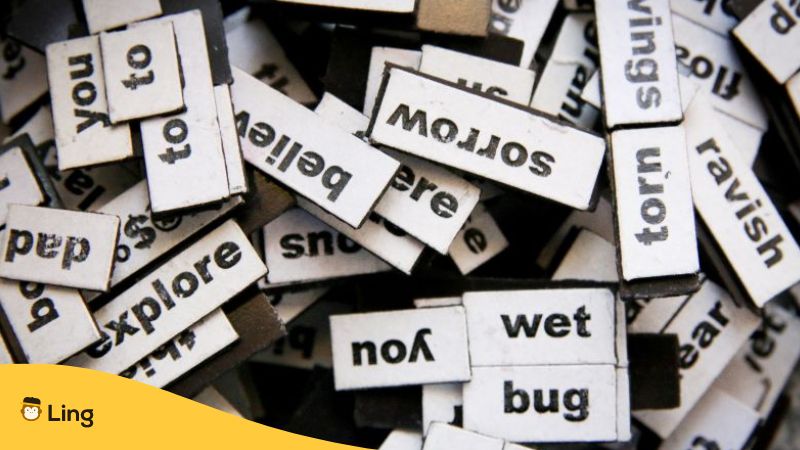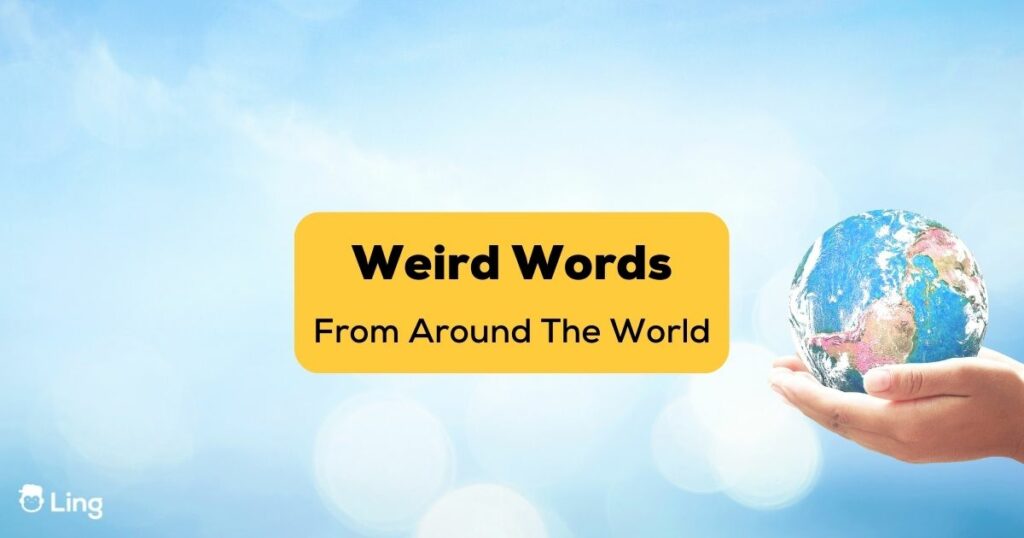Language is incredibly nuanced and stems from thousands of years of cultural influence & history. In today’s world with hundreds of modern languages, some words can sound silly or even nonsensical when taken from one language and spoken in another (especially in the English language!)
Every language has special words significant to that country’s culture and folklore passed down through generations. Even between dialects of the same language (for instance, Spain & Mexico), there are hundreds of discrepancies and ‘untranslatable’ words from place to place.
Today, we are looking at signature, outlandish, unusual words and their linguistic history & importance. These words are difficult to translate into a single English word, so we will look at their overall meanings & origins today.
Rhyming, inflections, false cognates, and silly syllable word sounds make this list as bizarre as it is. We’ll step back in time to discuss some of the weirdest words and their origins worldwide. Are you ready? Let’s learn!
20 Weird Words From Around The World

1. Snollygoster – USA
Try saying this word five times fast! ‘Snollygoster’ is a shrewd person, usually a corrupt politician, who does things for their own greedy motives.
The word may have derived from a half-reptile half-bird mythical creature called a ‘snallygaster’ from Maryland (but that is still to be determined). You’ll most likely hear this word while Congress is in session in the United States. It’s a big insult, so watch other people’s reactions to see them appalled!
2. Gluggaveður – Icelandic
Have you ever enjoyed a thunderstorm from the comfort of your home, listening to the world shake and watching lightning through the window? Well, the Icelandic word ‘gluggaveður’ means ‘window weather.’
It suggests that the weather is great because you are sheltered from the harsh reality of it! It’s similar to the Scandinavian concept of Hygge which we will also discuss in this article.
This concept applies to all types of weather—beautiful snowfalls, sunny days with harsh winds, or magnificent hailstorms. I love the Icelandic perception of enjoying the wonder & beauty of nature while curled up with a blanket and hot cocoa. It elicits such joy!
3. Hygge – Denmark & Norway
Scandinavian winters are cold, wet, and dark. People needed a way of flipping this narrative into cozy, warm, and restful; thus the lifestyle of Hygge was born. The definition of Hygge is a quality of being cozy and comfortable that gives a feeling of warmth and happiness. Like a hug!
Hygge means focusing on simple pleasures like snuggling under a blanket, lighting candles, or playing a board game by the fireplace. Taking the time to cultivate these practices will bring light into the harsh winters up north. Try to incorporate these slow-living practices in your life during wintertime and see how much it helps you!

4. Gezelligheid – The Netherlands
As Hygge is to Danish culture and Gluggaveður is to Icelandic culture, ‘Gezelligheid’ is to Dutch culture. This word is all heart, friendliness, and coziness. It’s like opening the door to your grandmother’s home as fresh cookies are baking in the oven. It’s warm, it’s familiar, it’s comfortable.
The root ‘gezel’ means friend or partner in Dutch. Gezelligheid can describe a place, person, memory, or anything or anyone that makes you feel at home.
Check out Best Dutch Movies & TV Series to watch while cozied up practicing gezelligheid.
5. Donnybrook – Ireland
Where does this funny word hail from? Back in the 1200s, the Donnybrook Fair in the town of Donnybrook (a district of Dublin) was infamous for its frequent brawls, heated debates, and rowdy behavior. Thus, the word ‘donnybrook’ was born! It is a noun meaning a heated quarrel or free-for-all fight.
6. Sobremesa – Spanish
‘Sobremesa’ (upon the table) is the Spanish custom of relaxing at the dinner table after a meal. Everyone is full, happy, and relaxed. The intimate atmosphere can last up to an hour or two as family members sip coffee, tea, and alcohol and even enjoy a cigar around the table. It is a lovely way to make the moment last and live slowly. All cultures should put sobremesa’ into practice!

7. Nincompoop – Britain
Now this one I’ve heard of … mainly in the elementary school courtyard! The word ‘nincompoop,’ meaning fool or idiot, has an interesting origin story. The word seems to come from the Latin legal phrase ‘non compos mentis’ meaning mentally incompetent (though this is up for debate among etymologists!) There are many weird English words, but this tops the list!
No matter its origin, the word ‘nincompoop’ is still regularly used in modern-day Britain. Although instead of a scathing insult, it’s more of a teasing term among friends. Kids especially love this word … I wonder why? 🙂
8. Tsundoku (積読) – Japanese
This Japanese word calls out all those book lovers who keep buying more books without reading the others. The intention to read the books is there, but the end result is not. The phenomenon of actively piling up books is super common, and, interestingly, the Japanese have one slang word for it!
Fun fact: The word ‘tsundoku’ has the same meaning as another weird word: bibliophobia. The ‘phobia’ in the word is the fear of running out of books to read!
9. Ya’aburnee ( يعبورني ) Arabic
Romantic yet morbid, ‘ya’aburnee’ translates to ‘you bury me’ in English. It’s when you love someone so much that you can’t imagine living without them, so you wish to die before them.
Read Many Ways To Say I Love You In Arabic to learn similar phrases to ya’aburnee.

10. Verschlimmbessern – German
A common plot point in comedy, ‘verschlimmbessern’ is an extremely long German word that translates ‘to make a situation worse through an honest attempt’. You try so hard to fix a situation and have good intentions, but you accidentally put more gasoline on the fire. We’ve all been there!
11. Yaourter – French
Usually, Frenchmen make fun of foreigners who cannot speak French, but this word means quite the opposite! The French term for gibberish, the word ‘yaourter’ refers explicitly to someone butchering a foreign language in song. Often the singers mishear the lyrics and mess it up so badly that it’s pretty comical.
The French are finally admitting that it’s hard learning another language! So be careful next time you’re at karaoke with a French person, you don’t want to risk being insulted by the term ‘yaourter!’
12. Aranyhíd – Hungary
Descriptive and alluring, the word ‘aranyhíd’ literally translates to golden bridge. It describes the gleaming reflection of the sun on the water around the bridge as it rises or sets. How beautiful!
Fun fact: The Hungarian language has a different word to describe the reflection of the moonlight on water … Can you guess what it’s called? The silver bridge, or “ezüsthíd” in Hungarian.
The images these words conjure are stunning, expressive, and unique. I wish there were more words like this in English!

13. Akihi – Hawai’ian
The native language of the stunning islands of Hawaii in the United States, the word ‘akihi’ refers to spacing out, or being removed from reality. Its meaning is comical rather than annoying, following the relaxed, laid-back Hawaiian culture.
Remember in school when your teacher would tell you the directions for the assignment and you’d immediately forget them? That is ‘akihi.’ It happens to all of us (some more than others!)
14. Toodle Pip – United Kingdom
Toodle pip sounds like an expensive dog breed, but it’s actually a parting phrase similar to ‘cheerio’ used in the United Kingdom. The goodbye phrase is nonsense, outlandish, and insanely proper, which is why it’s so funny & strange!
The origin is from the 20th century, with some experts saying it’s a slight alteration to the French ‘see you soon’ (à tout à l’heure). A similar goodbye is ‘toodle-oo,’ though I don’t know if you’d hear a young person say this.
Why all the ‘toodles?’ The term ‘toodle’ means the noise of a bell signaling departure. Thus, toodle was interwoven with common departure expressions in English!
15. Age-otori 上あげ劣おとり- Japanese
The Japanese have countless funny words for unfortunate events of the human experience. This specific word, age-otori, means to look worse after a haircut.
You go into the hairdresser so hopeful for good grooming, then are supremely knocked down when you look in the mirror afterward. Unfortunately, this incident occurs for many people, and now you have a weird word for it!
16. Backpfeifengesicht – German
I think we’ve found it … the perfect word! Has someone ever gotten under your skin so much that you just want to slap their face whenever they’re talking to shut them up? The Germans know this feeling and even have a word for it! ‘Backpfeifengesicht’ translates to ‘a face that needs a slap.’
A face that needs a slap. Lol! Don’t say the Germans show no emotion. Just look at all the colorful weird words they have for when emotions are high!

17. Saudade – Portuguese
One of the most famous words on this list, ‘saudade’ is a Portuguese word for an intense aching of the past. Usually talking about a lost love, this feeling of nostalgia, longing, and melancholy has been the inspiration for many Brazilian poems, songs, and novels.
This word and the emotions it elicits are a source of Brazilian pride. There is even a holiday, the Day of Saudade, celebrated every year on January 30th. Talk about how words & language can have an impact!
18. Kaizen 改善 – Japanese
Though you may have noted this term in your western corporate office, it originates from the Japanese language, meaning ‘change for the better.’ Kaizen is a compound word stemming from ‘kai’ meaning ‘change’, and ‘zen’ meaning ‘good’.
It is a philosophy of continual improvement in businesses and has been adopted by many famous companies like Toyota.
It is interesting how this Japanese philosophy has inspired western business structures. Words have definitions, philosophies, and interpretations that exist far wider than you would ever think.
19. Wabbit – Scotland
No, not the long-eared, furry-tailed animal! ‘Wabbit’ was first popularized in Scotland as a slang word to mean ‘worn out’ or ‘bone-tired.’ It is an adjective and used to describe feeling tired.
Example: I felt the most wabbit after school, so I went to lie down in my bed.
Silly, right?
20. Xertz – English Language
Our final word describes something I know every single person has done at some point in their life. Imagine it’s a horribly hot day, and you’re lethargic, cranky, and thirsty. The sidewalk is sizzling, and the sun is scorching down as you sweat and sweat.
Our word ‘xertz’ is the activity of grabbing a cool drink like lemonade or iced tea and guzzling it down in big gulps. That feeling of relief is powerful! Thus why there is a word that relates it. Man, I could use a cool drink right about now!

Which Weird Word Was Your Favorite?
Are you already deciding how to incorporate the new vocabulary you’ve learned, such as ‘backpfeifengesicht,’ ‘donnybrook,’ or ‘wabbit’ into the daily conversation? This weird word list is so much fun to play around with, especially when you know its origin!
Notice what countries top this list … Japan, Germany, and Britain. Are these the countries you most expected to have the strangest words?
Do you want to learn more about these languages but need help knowing where to start? Try out the Ling App, a user-friendly language learning app with proven features to help you learn(+ understand) a new language.
You can download it for free on the App Store and Play Store.
Want more exciting articles about worldwide languages? Check out Silly French Idioms & Most Beautiful Festivals Worldwide.
























